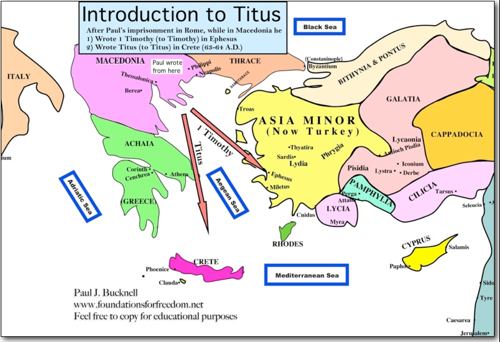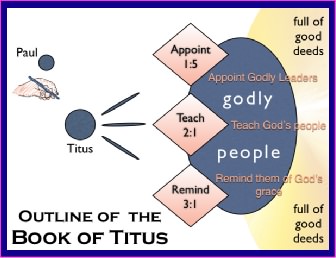

Shaped into God's Community
Book of Titus
The Bible Teaching Commentary
The Book of Titus:
An Introduction, Map and Outline
Paul J. Bucknell
_________________________
Titus Outline | Titus Map | Titus Commentary (see below)
Intro to Titus | Titus 1:1-4 | Titus 1:5-9 | Titus 2:1-2 | Titus 3:9-15
Purpose
Titus: An Introduction, Outline And Purpose serves as the introduction to the Book of Titus in The Bible Teacher's Commentary series. Several colored diagrams are included.
Introduction to Titus
“For this reason I left you in Crete, that you might set in order what remains, and appoint elders in every city as I directed you" (Titus 1:1-4).
Introduction
We might call ourselves the post-modern generation, a generation that is clever and knowledgeable. But we do not need to look far to find that this generation is, in fact, a very confused generation.
One would think that with all this money, advanced training and specialists about that we would be more advanced, but it is not true. We agree we still have the war problem. The past generations could not eliminate that either. But how is it that we have allowed our society to be so confused as to deny what we beforehand would call the facts of life. Instead of esteeming love, beauty and faithfulness in areas like marriage, relationships and the arts, society now promotes hatred, violence, envy and unfaithfulness. Justice and courts have degenerated into influence control centers: you pay we decide.
We would be fools, however, if we thought the problem was only out there, outside the church. The church has seemingly picked up the same problems. If we study the problem a bit closer, the confusion in the world is, in fact, accentuated by the confusion in the church.
As the church goes, so goes the community. The church is the salt and light in the world. When the church tolerates immorality, then the society herds in that direction.
When will the church learn and appreciate the power of the Gospel? We again desire the she becomes the precious and beautiful rather than the stained and worldly.
Yes, we know that many people call themselves the church that is not the church at all. For them, it is only a religion. But even still, the church, the real church, has a mission and nothing could keep her back if she would only live by her calling.
Why is it that segments of the church dare to lead the women from their families into the work place? Why is it that the church wants to push homosexuals into church leadership? Why is that church leaders condone and even encourage divorce as a choice of life? Whatever happened to morality and the holiness of marriage?
The Apostle Paul foresaw at the end of his life a great tsunami of attacks coming against the church of God. He responded with three letters. We call them the Pastoral Epistles: 1 Timothy, 2 Timothy and Titus. After Paul’s first imprisonment, he was released.

He visited different places including the island of Crete, an island only 160 miles long south of Greece and Turkey in the Mediterranean Sea. He wrote this letter to Titus around 62 A.D. from somewhere in Macedonia.
Fortunately, Paul has clarified many questions regarding the place of the church in the midst of attack. If you have questions, Titus has an answer for many questions. But we must remember to ask the right questions. Sometimes, we look for answers that fit comfortably in with our lifestyles. If so, you might not be happy with the answers that you find.
If the bottom line is that you want to find a church that is comfortable and fits with your standards, then you had better recognize that you are of the world. But if deep down, even though you are desperately struggling, you hope to know and please God, then you will find clear direction in this book. Even the most earnest Christian recognizes that he or she can be too affected by the world.
Paul at some point had visited the island of Crete for he says in Titus 1:5 “I left you in Crete.” The church had sprung up just as it has in almost every city on this globe. God had been at work. The church grew up and informal churches started in the different cities across the island. But troubles developed.
Jesus told the parable of the tares, “The kingdom of heaven may be compared to a man who sowed good seed in his field. “But while men were sleeping, his enemy came and sowed tares also among the wheat, and went away” (Matthew 13:24-25). Did you note when the enemy came and planted discord and confusion? It was when the men were sleeping.
Evidently, some men were sleeping in this case too. I have come to realize that through God’s promises we can have a wonderfully strong, church, family and individual lives. We can be effective serving. But if we let down our guard, trouble rushes in. Many of the troubles occur when we are sleeping, that is, not keeping our watch.
The church at Crete faced special problems. Missionary tours are often too brief. As a result, solid churches are not established. Perhaps it was because people were not sufficiently familiar with the Word of God. It took a bit longer to raise up trusted leaders. In any case, we find Paul writing the letter of 1 Timothy to Timothy who was then stationed at Ephesus and Titus at Crete. Paul’s death was eminent. Within another year or so, he would write 2 Timothy and under Nero be martyred probably about 64 A.D.
|
For Crete, however, it was time for godly leaders to be appointed. During the time of informal fellowship, Christians became prey to all sorts of self-appointed leaders and affected by their false teaching. When good leaders do not rise up, bad leaders will infiltrate and devastate the flock. Paul was exercising his apostleship by delegating Titus to appoint elders on his behalf. This letter, then, not only is a directive to Titus on how to “set the church in order” (verse 1:5) but also a public statement of Titus’ authority and a statement on how the church should conduct itself.
In many ways, this message fits our times. Yes, we have good leaders. But as we think of the church in general, it is being chewed apart almost without even knowing it. The wolves have come in. They are picking off Christians who have made themselves separate from the church. So though there be leaders and a church body, many no longer think it important to be part of the local church. And there again, there are as many public pulpits, some of which are good and others wretched.
When I was in India, I saw a Christian family watching one of these money-maker preachers. These false prophets undermine the care of the true caretakers of the flock. Discernment of these false shepherds cannot be gained because we do not know them but only hear their words. We all need the message here in this Book of Titus. We need a defining message for the church for it is from understanding who she is, that we can understand her mission.
The letter is very cohesive and basically consists in advice from Paul to Titus. Key verbs mark off each chapter. Chapter 1 “set in order and appoint elders.” Chapter 2 “Speak the things which are fitting for sound doctrine.” Chapter 3 “Remind them to be subject to rulers … be ready for every good deed.”

The key thought of this book, and the hope of the church is simply, ‘Good people do good deeds.’ We need to choose good leaders to have good churches (chapter 1). We need to have godly people to be zealous for good deeds (chapter 2). We need to be reminded that our goodness comes from Christ and from that relationship grows many more good deeds (chapter 3).
Of course, the opposite is true too and the church in Crete was facing a number of difficulties. They had ungodly leaders who were distorting the truth of the Gospel and creating havoc in the church. They had ungodly people who were living counter-Christian lives. They had no testimony. They had a general spirit of rebellion that, so to speak, disguised the power of the saving Gospel of Christ Jesus. Doesn’t this sound much like our age? How sad. Fortunately, we have the advice from Paul to guide the church.
In the outline below, please remember the original letter did not have chapters or verse numbers, but these are themes which are clearly seen as one section is compared with another.
Purpose of Titus: Shaped into God’s Community
Every bride looks beautiful. But behind that veil is a woman that needs to be shaped into a woman with beautiful inner qualities. This is her life call. So it is with the bride of Christ. A calling doesn’t bring all the glories of the church in a moment. She can grow. The difference is that now she belongs to Christ. God through Paul is calling the church to take significant strides closer to what she should be.
Outline of Titus
Shaped into God’s Community (The Book of Titus)
Three means God develops His people:
A. Appoint Transformed Leaders (1:1-16)
B. Cultivate Sanctified People (2:1-15)
C. Teach Vibrant Gospel Truth (3:1-15)
Paul affirms Titus’ authority to appoint godly leaders (Chapter 1) and instruct God’s people in godly behavior (Chapter 2) so that they might gain a proper understanding of the gospel (Chapter 3) and as a result be a godly people who will be full of good deeds. In simpler words, we can say the purpose is to “Create a godly people full of good deeds.”
The challenge and application of Titus
We have a great challenge before us. If we as God’s people are faithful to what is said here in Titus, we will be greatly used of God to reshape the society about us. We will reflect Christ’s glory more and more. As we see the glorious works of Christ worked through our lives, we will personal be enriched.
This is the reason God has left this scripture for us. If we are faithful choosing right leaders, conform to Christ’s calling for our lives and faithfully hold to the Gospel truths, we will see a host of good deeds coming from our lives much like the rays of the sun. Light will shine in a dark world.
=> Next: Titus 1:1-4 Introduction
Other related articles from Biblical Foundations for Freedom:
Detecting Error Inside and Outside the Church.Building a Great Marriage!
info@foundationsforfreedom.net
Scriptures typically quoted from the New American Standard Bible unless noted:
(C) Copyright The Lockman Foundation 1988










